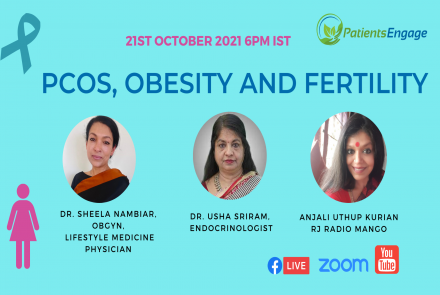PCOS is a growing cause of concern among women these days. Women with PCOS struggle with weight issues, skin and hair issues as well as fertility issues.
PCOS can be managed. Find out how.
Join us as we speak with
Anjali Uthup Kurian, RJ Radio Mango and Trustee, Sunny Foundation
Dr. Usha Sriram, Endocrinologist and Founder Diwas, which is focussed on women's health
Dr. Sheela Nambiar, OBGYN and Lifestyle Medicine Physician
Moderated by Aparna Mittal of PatientsEngage
When:
21st October…
Obesity
- Diabetes Awareness Month 2016 You're more likely to develop type 2 diabetes if you're overweight or obese with a body mass index (BMI) of 30 or more. According to Dr Anil Bhoraskar, leading diabetologist, ‘Thin fat Indians’ who have low BMI but have most of the fat accumulated around the tummy are particularly at risk. According to the Lancet study, China, India and USA are among the top three countries with a high number of diabetic population. While the numbers climbed from 20.4 million in…
- Childhood obesity is a matter of concern in both developed and developing countries, differing perhaps in degrees, and can only be controlled through combined effort of public health programmes initiated at government or equivalent levels and the conscious effort of parents, says Dr Sitanshu Kar. Also, tips for parents. 1. The social inequality that has a direct association with obesity seems to be reversed in developed countries. In developed countries such as the USA, the lower socioeconomic…
- More than 2.1 billion people, or nearly 30% of the global population, are overweight or obese. Excess weight leads to about 5% of worldwide deaths. On current trends, almost half of the world’s adults will be fat by 2030. Over the past three decades, according to a study in the Lancet, a medical journal, no nation has slimmed down. But a new study from the McKinsey Global Institute (MGI), the consultancy’s research arm, offers some hope. It looks at 74 anti-obesity measures around the…
- For some people, the smell of good food can trigger a feeding frenzy. But others find it much easier to resist such temptations. What’s the explanation? Is it willpower ? A recent study in the journal Molecular Psychiatry suggests the answer to what fuels susceptibility to food cues may be far more complex, related to subtle differences in brain chemistry. The PET scans showed that, compared to their leaner counterparts, obese individuals had more dopamine-triggered signaling activity in…
- In a study that followed more than 2,200 obese women during pregnancy, scientists found that some simple interventions can help prevent high birth weights in newborns. This is important because previous studies have shown that infants with a high birth weight have a greater risk of becoming obese as children or adults. Professor Jodie Dodd summarizes the results: "Infants born to women who received lifestyle advice were 18% less likely to have a high birth weight compared to infants born to…
- Childhood obesity can have a harmful effect on the body in a variety of ways. Obese children are more likely to have : High blood pressure and high cholesterol, which are risk factors for cardiovascular disease (CVD). In one study, 70% of obese children had at least one CVD risk factor, and 39% had two or more. Increased risk of impaired glucose tolerance, insulin resistance and type 2 diabetes. Breathing problems, such as sleep apnea, and asthma. Joint problems and musculoskeletal…
- People who live in neighborhoods that are conducive to walking experienced a substantially lower rate of obesity, overweight and diabetes than those who lived in more auto-dependent neighborhoods, according to a pair of studies presented at the American Diabetes Association's 74th Scientific Sessions. http://www.diabetescare.net/article/title/neighborboods-that-encourage-walking-reduce-obesity-and-diabetes Those who read this, also read one of our contributor's journey as a diabetic for…














